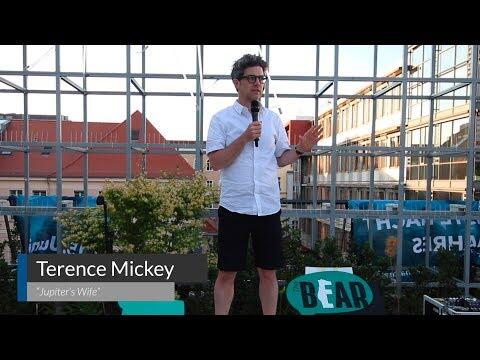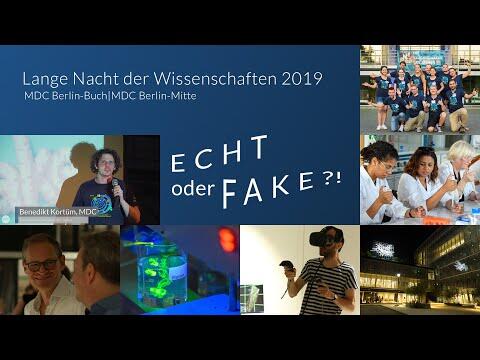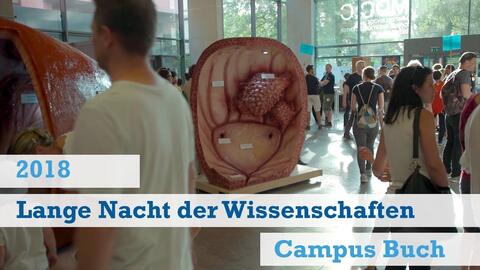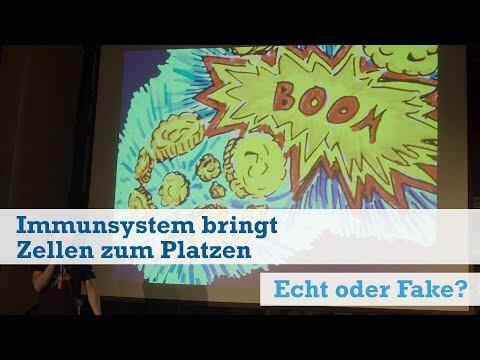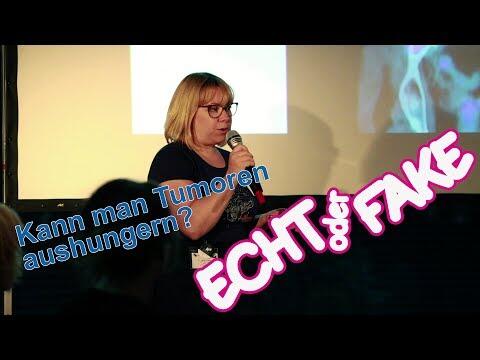Robert-Rössle-Straße 10
13125 Berlin
4 p.m. - 11 p.m.
Hannoversche Str. 28
10115 Berlin
5 p.m. - 12 a.m.

The event is made for science enthusiasts of all ages, there are:
The Long Night of Sciences takes place once a year on a Saturday in June. With our locations on the Buch Campus and in Berlin-Mitte we participated on June 22, 2024.
© Header: elekktronaut x studio gid
The MDC program ranges from interactive experiments and shows to the opportunity to look over the shoulder of scientists in the laboratory. Some of the highlights are presented here.
Scientists at the Campus Buch invite you to their research labs to give you a glimpse into the future of medicine. They will present current biomedical research – topics and methods – and explain what we have learned so far about the “human system”. The number of participants is limited for all tours at the Max Delbrück Center.
Registration required: central info point
Huntington's, Alzheimer's and Parkinson's diseases all have one thing in common: misfolded proteins are deposited in the brain and poison the nerve cells there. We use the common vinegar fly as a model for neurodegenerative diseases to get to the molecular bottom of the causes and effects of misfolded proteins.
Registration: central information point MDC.C.
Pick a science topic that needs to be discussed – such as antibodies or genome editing. Add some coffee, take a seat, and let dedicated scientists serve you everything. Et voilà – the recipe for Café Scientifique is as simple as it is ingenious. Enjoy!
Location: MDC.C foyer or terrace
Science is matter-of-fact and art is emotional – is that true? Research and work in the arts are both experimental and creative processes. Many scientists also paint, perform music, and take photographs. Some of them exhibit their artwork on the Buch campus.
We can produce most cells of an organism from pluripotent stem cells. We will show you how this works and how we use it to develop personalized therapeutic approaches and even save endangered species. There are also three stations for pipetting: Adults can compete against a robot, kids can pipette different patterns into a plate using colored liquids – wearing lab coats and gloves, of course – and finally, teams of two or four can compete to see who can insert pipette tips the fastest.
Our laboratory delves into the intricacies of the somatosensory system and its neuronal circuits. How do we perceive touch and temperature? And how can we accurately measure neurological signals? Through interactive scenarios, we make our research tangible and accessible.
Embark on a journey through the body and find your favorite organ in our MRI images! At our booth, you can try to segment an organ yourself on our computers and compare your results with the experts, artificial intelligence and other guests.
Thomas Gladytz
Each day, the human heart beats around 100,000 times. It keeps blood flowing in one direction through the four different chambers, and it ensures that the body is supplied with oxygen and nutrients and carbon dioxide and waste products are carried away from other vital organs and tissues. But what does the heart look like from the inside? What kind of tendons are attached to it, and how can you tell if an aortic valve is damaged? During the Long Night, you can explore a walk-in heart model and ask our scientists all your questions.
Scientists at the Max Delbrück Center invite you to their research labs to give you a glimpse into the future of medicine. They will present current biomedical research – topics and methods – and explain what we have learned so far about the “human system”. The number of participants is limited for all tours at the Max Delbrück Center. Registration: central info point.
During embryonic development, a fertilized egg develops into a complete organism with many specialized cell types and tissues within a few weeks. But how do our cells know whether they should become a heart, nerve or liver cell? And how do cells communicate with each other to form complex tissues and organs? We will show you how we find out, using complex computer models based on single-cell sequencing data and organoids. Join us on this special journey!
Registration required: central info point on the ground floor
If you stretch the DNA molecule from a single human cell all the way out, it would be about two meters long. However, the nucleus of a human cell, which contains the DNA, is only about six μm in diameter – this is as small as a Kinder Surprise in comparison to Berlin’s TV tower! How does DNA fit inside such a small space and how does DNA folding affect gene activity and the biology of our cells? We at the Pombo lab use state-of-the-art techniques to study the role of chromatin origami in health and disease.
Registration required: central info point on the ground floor
A tour and robot demo of the Single-cell Focus Area labs: Our body is made up of trillions of cells and every day they work together to perform the functions of life. However, when these cells go rogue, disease can strike! To better understand these cells, we can now look at them one by one, using modern single-cell technologies! Join us to learn how we look at each cell to understand the genetic and molecular changes that keep us healthy, or not.
Registration: central info point at the ground floor
Because of conceptual similarities between the multiscale nature of music and biology, some algorithms used to process biological data can be adapted to compose music. Daniel Leon will explain and demonstrate on the piano, how such an AI-based algorithm can replicate Bach’s chorales so well, that experts cannot distinguish between his actual compositions and those generated by AI. During his presentation, he will also dissect compositions from Händel to show why some music composition is so complex, that AI cannot reproduce it, at least not yet.
Did you pay attention during the presentations and lab tours? Are you familiar with sports, music, the big and small things of everyday life? Then compete against each other in small groups in our PubQuiz and put your knowledge to the test! Everyone can contribute and join in the guessing, the focus is on the team: whether expert or rookie, student or teacher, janitor or manager - the best team wins!
Can a chatbot help oncologists to find the right therapy for a particular patient? We develop and train AI tools to analyze genetic data and identify key markers for diagnosis and treatment – to improve patient outcomes and advance precision medicine. One main focus area is discovering targets to treat solid tumors. In this case, we are using language models to interpret and solve data analysis problems. Curious about how this works? At our booth, you can interact with our AI tools via terminals. These are chatbots or other large language model-based technologies.
Pipetting, measuring, finding information – in our Lab Olympics you can put your abilities up to a test and find out whether you have what it takes to master the every-day lab work. A lab selfie is included.
